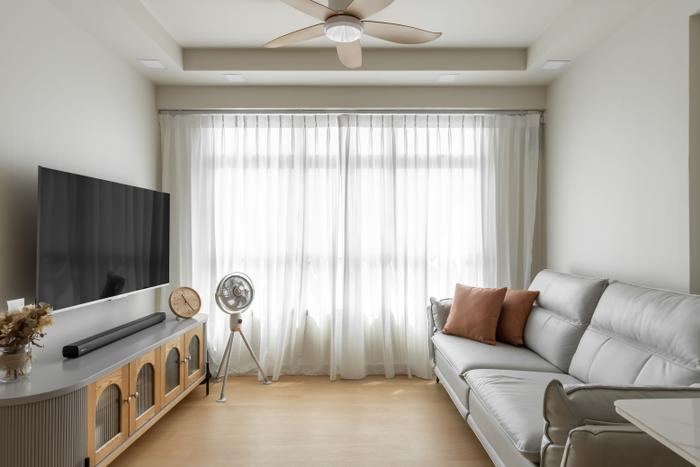TL;DR answer at the end.
Renovating a home is no mean feat – it’s a costly, complicated, and often stressful undertaking and homeowners should be vigilant and careful every step of the entire journey. When done right, the returns often exceed the monetary value as homeowners end up with a beautiful space that not only functions well but also brings them an immense joy to live in every day.

View this project by H Design
But this is not always the case as not all businesses are fairly run. Horror stories about bad service, shabby construction work, and even scams by interior design firms still continue to surface from time to time... So how should homeowners protect themselves from getting the shorter end of the stick? While accreditations issued by HDB and CaseTrust offer a basic safety net, they should not be the only factor that lends credit to an interior design firm or construction company.

View this project by The Interior Maison
What do the accreditations mean?
HDB Directory of Renovation Contractors (DRC; AKA HDB-licensed firms)
A contractor who’s listed under the HDB Directory of Renovation Contractors (DRC) has been acknowledged by the public housing board to be conscious of HDB’s renovation work requirements. This accreditation does not mean that HDB recommends or guarantees the contractor’s renovation work quality.

View this project by TM Designers
According to HDB's website:
“Engaging these contractors is a private contract between you and the contractors, and HDB is not privy to it. The contractors are fully responsible for the contractual obligations towards their clients, including the quality of their works. If there is any disagreement on the pricing, schedule, or quality of the renovation, both parties need to resolve the matter between yourselves. If the matter cannot be settled amicably, you can seek assistance through CASE or the Small Claims Tribunals. Alternatively, you can seek a remedy through court proceedings.”

View this project by BuildBuilt
Generally, interior design firms are not obliged to be registered under this scheme as designers do not execute the renovation works with their own two hands. They often sub out these works to contractors, and this HDB scheme is targeted specifically at getting contractors who handle the manual work licensed - a common misconception among homeowners that one should only engage HDB-licensed firms.

View this project by Elique.Co
CaseTrust Accreditation Scheme for Renovation Businesses
As its name suggests, the CaseTrust Accreditation Scheme for Renovation Businesses was established by CaseTrust to increase industry standards of professionalism, as well as to give homeowners (like you!) peace of mind when renovating.
It requires companies to protect a customer’s deposit payment through the purchase of a deposit performance bond. This ensures that homeowners’ monies are safe in the face of the firm’s closure or liquidation.

View this project by Brown Studio Interior Design
Interior design firms accredited under this scheme are also recognised for their cost transparency, accountability, and general good business practices. Customers can expect documented policies on payment terms, clearly defined dispute resolution mechanisms, and ethical sales staff.
To be on the safe side, it’s best to confirm with the interior design firm if they are working with contractors that are the aforementioned HDB Directory of Renovation Contractors (DRC). And do check out the company’s reviews by other homeowners on Qanvast to get a better gauge of their reputation.

View this project by Areana Creation
So, are they really crucial?
[TL;DR] It's not a must for the interior design firm you engage to have these accreditations; but they are definitely indicative of a certain level of quality, and therefore good to have.
That said, these accreditations aren't a be-all and end-all, as there are other things to look out for as well. These include the firm’s portfolio (and whether it matches the aesthetic you’re going for), price, services, and sometimes simply whether you have chemistry with the designer.

View this project by Oblivion Lab
To better prepare for your own renovation journey, you may also wish to refer to the following resources:
The S$50,000 Qanvast Guarantee
To give homeowners more assurance, you can now opt-in for the free Qanvast Guarantee scheme when you engage with the interior firm via Qanvast. This scheme safeguards your renovation deposits, up to S$50,000 when the firm becomes insolvent.
And for even more perks like extended warranty coverage, refundable deposits (should you change your mind within 7 days of contract signing) and upsized home furnishing deals, join the Qanvast Trust Programme when you connect (not just sign!) with interior firms via Qanvast.

View this project by Mu Design Studio
The next burning question you may have in mind - should you go with an interior designer or contractor or how do you not get cheated by an interior designer? We have the answers here.
This article was originally published on 7 October 2016 and last updated on 15 June 2023.

 Get a budget estimate before meeting IDs
Get a budget estimate before meeting IDs